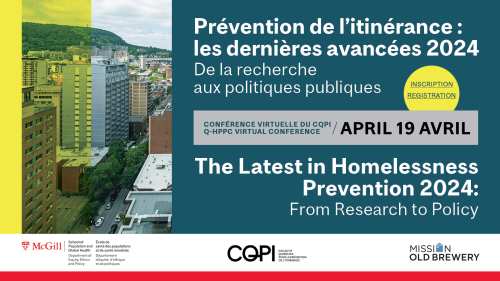2025 Events
Echoes of the Ice Film Screening
September 25th 6-7:30pm
Location : 2001 McGill College 11th floor room 1140

The McGill Center for Climate Change and Health invites you join us for an evening with Indigenous Geographic! This event will include a screening of their award winning short film entitled “Echoes of the Ice” as well as a reception and Q&A session with the founders of Indigenous Geographic (Crystal Martin and Matt Lemay) to learn about best practices in collaborating with Indigenous communities. Space is limited, be sure to register!
Event will be followed by a Q & A and wine and cheese with film makers Matt Lemay and Crystal Martin
Cosponsored with The McGill Centre for Climate Change and Health and The Bieler School of Environment
Watch the trailer here
 Conference May 12th, 2025 - 8:30 AM to 5 PM
Conference May 12th, 2025 - 8:30 AM to 5 PM
From Extreme Events to Emerging Threats: Translating Climate and Health Research into Actionable Solutions
Where: McGill Faculty Club or online
3450 Rue McTavish, Montreal Quebec H3A 0E5
This one-day conference will examine how climate and health can be used to frame both challenges and solutions. We will explore the health impacts of both climate change disasters and emerging threats, and engage in discussions with both policy actors and community groups about the latest innovations and technologies being used to mitigate the consequences that climate change has on public health and wellbeing.
Lecture series in winter 2025:
Building Climate Resilience: Public Health Solutions for a Changing Environment
This series is presented as a collaboration between the Department of Equity, Ethics and Policy and the McGill Centre for Climate Change and Health.
CANCELLED - April 29, 2025 - 12-1
Hybrid - 2001 McGill College, 11th floor, room 1140 or via ZOOM
Climate change, extreme heat, and health
Abstract: Climate change has resulted in an increase in the global mean temperature. In recent decades, Canada has seen a rise in the frequency, duration, and intensity of heat waves. In order to provide patient care and health care delivery with broader strategies for mitigating and adapting to rising temperatures, a comprehensive understanding of the wide range of health impacts of extreme heat exposure is crucial. This presentation will summarize the epidemiological evidence on the health risks associated with heat, its disproportionate impact on vulnerable populations, and the protection strategies that can be taken at both the individual and community-level to prevent these risks.
Speaker Biography:
 Eric Lavigne is a Research Scientist with Health Canada and an Adjunct Professor in the School of Epidemiology and Public Health at the University of Ottawa. His research interests include the interconnections between air pollution and climate change, particularly in the context of early life exposure and children's health. The research is aimed at being policy-relevant and contributing to well-informed decision-making to improve the protection of human health.
Eric Lavigne is a Research Scientist with Health Canada and an Adjunct Professor in the School of Epidemiology and Public Health at the University of Ottawa. His research interests include the interconnections between air pollution and climate change, particularly in the context of early life exposure and children's health. The research is aimed at being policy-relevant and contributing to well-informed decision-making to improve the protection of human health.
April 3, 2025 - 12-1
Hybrid - 2001 McGill College, 11th floor, room 1140 or via ZOOM
The potential of carbon offsets in agriculture: promoting the adoption of technologies and best management practices
Abstract: Carbon sequestration practices have the dual benefit of replenishing soil organic matter levels while simultaneously mitigating greenhouse gas emissions by capturing and storing carbon in agricultural soils. Despite their potential, these practices are far from being widespread. The first part of the talk will examine how uncertainty and risk play a part in farmer’s decisions to adopt intercropping, a practice shown to enrich soils and absorb carbon. The second part of the talk will examine how carbon offsets might be designed to incorporate agriculture and promote the adoption of practices, like intercropping, that offer producers benefits while helping offset greenhouse gas emissions.
Speaker biography:
 Aurélie Harou is an agricultural, development and resource economist. Some of her recent research examines farmer behavior and incentives to reduce groundwater consumption in India, quantifies the effects of cultivating multiple seasons on resiliency, nutrition and food security in Malawi, and estimates the effect of climate change on cooperation among farmers in an irrigation scheme in Tanzania. She has published in leading journals including the American Journal of Agricultural Economics, Journal of Development Economics, Journal of Environmental Economics and Management, among others, and is an associate editor of the American Journal of Agricultural Economics. She partners with local organizations as well international ones, including the United Nations Food and Agricultural Organization, the United Nations World Food Program and the World Bank, CIAT, CIMMYT, IMWI. She holds a BSc in Geography and Environmental Science from the University of Sussex, an MS in Agricultural and Resource Economics from the University of California Davis and a PhD in Applied Economics and Management from Cornell University. Before joining the faculty in the Department of Natural Resource Sciences at McGill, she was an Earth Institute post-doctoral fellow at the Agriculture and Food Security Center and the International Research Institute for Climate and Society at Columbia University.
Aurélie Harou is an agricultural, development and resource economist. Some of her recent research examines farmer behavior and incentives to reduce groundwater consumption in India, quantifies the effects of cultivating multiple seasons on resiliency, nutrition and food security in Malawi, and estimates the effect of climate change on cooperation among farmers in an irrigation scheme in Tanzania. She has published in leading journals including the American Journal of Agricultural Economics, Journal of Development Economics, Journal of Environmental Economics and Management, among others, and is an associate editor of the American Journal of Agricultural Economics. She partners with local organizations as well international ones, including the United Nations Food and Agricultural Organization, the United Nations World Food Program and the World Bank, CIAT, CIMMYT, IMWI. She holds a BSc in Geography and Environmental Science from the University of Sussex, an MS in Agricultural and Resource Economics from the University of California Davis and a PhD in Applied Economics and Management from Cornell University. Before joining the faculty in the Department of Natural Resource Sciences at McGill, she was an Earth Institute post-doctoral fellow at the Agriculture and Food Security Center and the International Research Institute for Climate and Society at Columbia University.
March 20, 2025 - 1:30-2:25
Hybrid - 2001 McGill College, 11th floor, room 1140 or via ZOOM
Unraveling the biophysical mechanistic links between climate change and infectious disease transmission
Abstract: There is clear evidence that climate change will alter the timing, intensity, and geographic range of infectious disease outbreaks with important implications for public health. Nevertheless, the mechanistic links between climate and infectious disease transmission, particularly for respiratory infections, remain incompletely resolved. Consequently, models that incorporate climate into disease transmission largely rely on the use of statistical methods to regress the time-varying transmission rate derived from epidemiological data against climate variables, despite there being many insufficiencies to these approaches. In this talk, we will discuss known climate-sensitive biophysical drivers of a broad range of infectious diseases, including vector- and water-borne infections. We will then focus on our work in the area of respiratory infections, unraveling the biophysics of aerosol-based transmission in complex mucosalivary fluids.
Speaker Biography:
 Caroline Wagner is an Assistant Professor in the Department of Bioengineering at McGill University. She holds an MSc and PhD in Mechanical Engineering from MIT, where she used experiment and theory to study the microscopic and macroscopic rheological properties of mucus. She then trained as a postdoctoral fellow in mathematical disease modeling at Princeton University. Her research program focusses on understanding interactions between pathogens and biological fluids, and modeling the effect of such interactions on population-level disease transmission and dynamics. During the Covid-19 pandemic, Caroline and her colleagues developed models to explore the effect of various factors including immune responses, vaccine dose spacing, and vaccine nationalism on the future burden and timing of Covid-19 infections. This work resulted in three publications in the journal Science, and has been covered in numerous media outlets including Quebec Science, La Presse, and Wired.
Caroline Wagner is an Assistant Professor in the Department of Bioengineering at McGill University. She holds an MSc and PhD in Mechanical Engineering from MIT, where she used experiment and theory to study the microscopic and macroscopic rheological properties of mucus. She then trained as a postdoctoral fellow in mathematical disease modeling at Princeton University. Her research program focusses on understanding interactions between pathogens and biological fluids, and modeling the effect of such interactions on population-level disease transmission and dynamics. During the Covid-19 pandemic, Caroline and her colleagues developed models to explore the effect of various factors including immune responses, vaccine dose spacing, and vaccine nationalism on the future burden and timing of Covid-19 infections. This work resulted in three publications in the journal Science, and has been covered in numerous media outlets including Quebec Science, La Presse, and Wired.
February 27, 2025 - 1:30-2:25
Hybrid - 2001 McGill College, 11th floor, room 1140 or via ZOOM
Preservation engineering and climate change-adapted building design
Abstract: This talk explores how preservation engineering adapts current buildings to withstand more extreme weather, altered trends in temperature fluctuations and environmental stresses, while also guiding the design of new structures built to endure the increasing impact of climate change. Dr. Daniele Malomo’s research combines sustainable retrofit and repair methods for existing buildings with climate-adaptive principles in new designs. Through innovative engineering strategies and digital tools, this approach provides practical solutions for a resilient built environment that meets the demands of a changing climate.
Speaker biography:
 Professor Malomo is the director of struct-lab, a cutting-edge structural engineering research lab at McGill University working on earthquake engineering, old structures, climate change-adapted design, numerical and experimental simulations. Since 2021, he serves in the Board of Directors of the Canadian chapter of the International Council on Monuments and Sites (ICOMOS), as well as an expert member of the International Scientific Committee on the Analysis and Restoration of Structures of Architectural Heritage (ISCARSAH). His work has recently been awarded by The Masonry Society (TMS), Pacific Earthquake Engineering Research Center (PEER) and the International Association of Bridge and Structural Engineering (IABSE).
Professor Malomo is the director of struct-lab, a cutting-edge structural engineering research lab at McGill University working on earthquake engineering, old structures, climate change-adapted design, numerical and experimental simulations. Since 2021, he serves in the Board of Directors of the Canadian chapter of the International Council on Monuments and Sites (ICOMOS), as well as an expert member of the International Scientific Committee on the Analysis and Restoration of Structures of Architectural Heritage (ISCARSAH). His work has recently been awarded by The Masonry Society (TMS), Pacific Earthquake Engineering Research Center (PEER) and the International Association of Bridge and Structural Engineering (IABSE).
Housing Security for Women Fleeing Violence: The Effectiveness of Transitional (Second-Stage) Shelters
Friday, March 21, 2025: 12:00 to 13:30
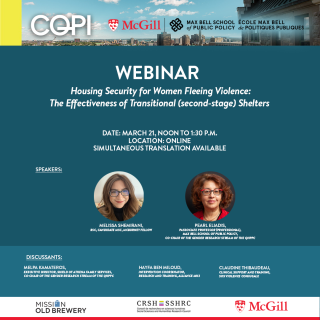 DEEP is pleased to invite you to join us for this webinar co-hosted by the Quebec Homelessness Prevention Policy Collaborative (an initiative co-founded by the Old Brewery Mission and DEEP) and the MaxBell School of Public Policy.
DEEP is pleased to invite you to join us for this webinar co-hosted by the Quebec Homelessness Prevention Policy Collaborative (an initiative co-founded by the Old Brewery Mission and DEEP) and the MaxBell School of Public Policy.
The effectiveness of transitional (second-step or second-stage) shelters for women fleeing violence is poorly understood and has been the subject of few comprehensive studies. In Quebec, this form of housing – as a mechanism to prevent homelessness – has been the focus of the work of the QHPPC. In 2024, a comparative, rapid review of the literature was undertaken to assess the relative effectiveness of first- and second-stage shelters in helping women escape domestic violence and achieve stable housing in Quebec. Input was also sought from a reference group of experts and survivors about the functioning of shelters in Québec. This webinar will share preliminary results, explore the essential role of these shelters, and highlight promising practices and approaches.
Description: This webinar discusses the results of a literature review and of an expert reference group in Quebec in 2024 examining the role and effectiveness of second-stage shelters for victims of domestic and intimate partner violence as a strategy for preventing homelessness.
Speakers: Melissa Shemirani, BSc, MSc candidate, McBurney Fellow; Pearl Eliadis, Associate Professor (professional) Max Bell School of Public Policy, Co-chair of the Gender Research Stream of the QHPPC
Discussants:
- Melpa Kamateros, Executive Director, Shield of Athena Family Services; Co-chair, Gender Research Stream of the QHPPC
- Hayfa Ben Miloud, Intervention coordinator, Research and Training, Alliance MH2
- Claudine Thibaudeau, Clinical support and training, SOS violence conjugale
Climate Justice in the Age of Polycrisis
The McGill Department of Global and Public Health and the McGill Centre for Climate Change and Health are delighted to invite you to a talk with Caroline Brouillette, Executive Director of Climate Action Canada, titled Climate Justice in the Age of Polycrisis.
- Date: Tuesday, March 18, 2025
- Time: 12PM – 1PM
- In-person: 2001 McGill College Avenue, 11th floor, room: 1140
- Online: registrants will receive the Zoom link via email prior to the event
Description:
We’re facing the climate crisis, increasing geopolitical tension, an eroding social safety net and the rise of xenophobia and the far right. US broligarchs have unleashed the threat of tariffs on the Canadian economy, leading to economic anxiety and fossil fuel profiteering. Corporate-aligned governments of all stripes are profiting off this moment to promote further resource extraction, deregulation and deportations. What does a people-first response to this moment look like, and how can it cut through all the noise?
Climate Action Network Canada leads the country’s farthest-reaching network of organizations working on climate and energy issues. Known as Climate Action Network – Réseau action climat (CAN-Rac) Canada, this coalition of more than 180 organizations spans coast to coast to coast. The network unites environmental groups with trade unions, First Nations, social justice organizations, development and health advocates, youth groups, faith communities, and local grassroots initiatives.

Caroline Brouillette
Caroline is the Executive Director of Climate Action Network Canada. Caroline is the first francophone Director of the network, and works tirelessly to create strong social consensus for climate solutions that address the convergence of crises the world is faced with, both through national policy development and in international diplomacy fora. Caroline is a columnist for L'actualité, Canada's leading French-language public affairs magazine, where she writes about climate issues.
McGill-UofT Wellbeing Research Seminar
The McGill-UofT Wellbeing Research Seminar Series is co-organized by Dr. Felix Cheung (University of Toronto) and Sofia Panasiuk (University of Toronto), Anthony McCanny (University of Toronto), and Dr. Chris Barrington-Leigh (McGill University). The seminar series is open to all and will be held online via Zoom.
Registration for this series/any talk is required in advanced, but is free.
Schedule Winter 2025
Social Media and Wellbeing miniseries
 January 14 (12 pm ET) - Professor David G Blanchflower - The Declining Wellbeing of the Young
January 14 (12 pm ET) - Professor David G Blanchflower - The Declining Wellbeing of the Young
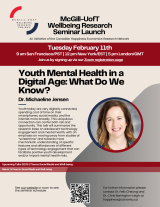 February 11 (12 pm ET) - Professor Michaeline Jensen - Youth Mental Health in a Digital Age: What Do We Know?
February 11 (12 pm ET) - Professor Michaeline Jensen - Youth Mental Health in a Digital Age: What Do We Know?
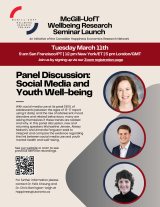 March 11 (12 pm ET) - Panel Discussion: Social Media and Wellbeing
March 11 (12 pm ET) - Panel Discussion: Social Media and Wellbeing
Webinar - Preventing homelessness for people with compulsive hoarding disorder
January 17, 2025: 12:00-1:30
Online
Presentations will be in English with French-English interpretation.
Compulsive hoarding disorder affects around 2% of the general population. It manifests itself in the accumulation of objects or animals that can make a dwelling unsanitary or a fire hazard. As a result, those affected are at risk of eviction and homelessness.
An adequate response to the problem requires both a rapid response when eviction is imminent, and a long-term response to address the underlying issue. We will present a synthesis of the latest research data, take stock of the services available in Quebec, and introduce an innovative program, Buried in Treasures, run by Ottawa-based Options Housing. Preliminary recommendations for preventing homelessness among these people will also be presented.
Speakers:
-
Eric Latimer, Co-Chairman of Q-HPPC and Douglas Centre Researcher
-
Alex Schurr, Research Assistant, Douglas Centre
-
Anne-Julie Roy, Director of External Services, La Maison grise and Co-Director, CATAC
-
Carole Dozo, Coordinator, CATAC
-
Chioma Obiakor and Greg Saxe, Hoarding Assistance Team, Options Housing
This event is presented by the Quebec Homelessness Prevention Policy Collaborative.
2024 Events
McGill-UofT Wellbeing Research Seminar
The McGill-UofT Wellbeing Research Seminar Series is co-organized by Dr. Felix Cheung (University of Toronto) and Sofia Panasiuk (University of Toronto), Anthony McCanny (University of Toronto), and Dr. Chris Barrington-Leigh (McGill University). The seminar series is open to all and will be held online via Zoom.
Registration for this series/any talk is required in advanced, but is free.
Schedule Autumn 2024
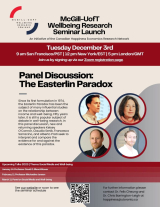 Date/Time - December 3rd (12 pm ET)
Date/Time - December 3rd (12 pm ET)
Speaker: Kelsey O’Connor, Claudia Senik, Francesco Sarracino, and Alberto Prati
Title: Panel Discussion: The Easterlin Paradox
 Date/Time - November 12th (12 pm ET)
Date/Time - November 12th (12 pm ET)
Speaker: Claudia Senik
Title: Is it possible to raise national happiness?
 Date/Time - October 8th (12 pm ET)
Date/Time - October 8th (12 pm ET)
Speaker: Kelsey O’Connor
Title: Evidence for the Easterlin Paradox
Suicide Prevention as a Public Health Strategy: Historical Perspectives
November 21st, 2024 - 12h00 to 13h00 EST
Hybrid - Room 1140 2001 McGill College, 11th floor or on ZOOM
Speaker:
 David Wright is Professor of History and Canada Research Chair in the History of Health Policy at McGill University. A specialist in the social history of medicine, he has published widely on the history of psychiatry, children’s health, and the development of hospitals. His most recent book (with Sasha Mullally), Foreign Practices: Immigrant Doctors and the History of Canadian Medicare, was published by McGill-Queen’s University Press, in 2020.
David Wright is Professor of History and Canada Research Chair in the History of Health Policy at McGill University. A specialist in the social history of medicine, he has published widely on the history of psychiatry, children’s health, and the development of hospitals. His most recent book (with Sasha Mullally), Foreign Practices: Immigrant Doctors and the History of Canadian Medicare, was published by McGill-Queen’s University Press, in 2020.
Abstract:
The prevention of suicide has constituted a major public health concern in Canada for over half a century. Following the decriminalization of attempted suicide (1972), and the identification of suicide as a public health priority in the Lalonde Report of 1974, there have been multiple overlapping initiatives employed to address this tragic social phenomenon. Strategies have included crisis centres, volunteer-staffed telephone services, barriers at suicides “hot spots”, public awareness campaigns, and repeated calls for enhanced mental health services. This presentation looks back on the first generation of suicide prevention strategies, analyzing how and why they became a priority in the decade leading up to the Canada Health Act of 1984.
McGill Centre for Climate Change and Health Launch
 November 20th, 2024 - 16h30-18h00
November 20th, 2024 - 16h30-18h00
School of Population and Global Health
2001 McGill College Ave. 11th floor
room 1140
Medical Assistance in Dying and the Rights of Persons with Disabilities: Justice, Autonomy, Equality, and Ethics
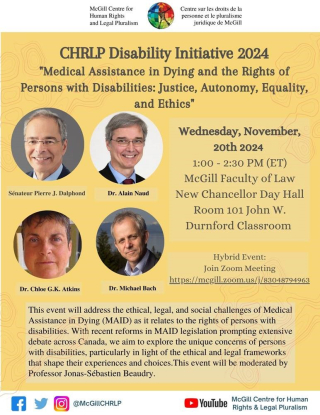 Wednesday, November, 20th 2024
Wednesday, November, 20th 2024
1:00 - 2:30 PM (ET)
McGill Faculty of Law
New Chancellor Day Hall
Room 101 John W. Durnford Classroom
Organized by CHRLP’S Disability and Human Rights Initiative - This event will address the ethical, legal, and social challenges of Medical Assistance in Dying (MAID) as it relates to the rights of persons with disabilities. With recent reforms in MAID legislation prompting extensive debate across Canada, we aim to explore the unique concerns of persons with disabilities, particularly in light of the ethical and legal frameworks that shape their experiences and choices.
- Sénateur Pierre J. Dalphond is the leader of the Groupe progressiste du Sénat, a member of the joint committee on MAID, and has analyzed MAID legislation.
- Dr. Alain Naud is a palliative care doctor and a pioneer of MAID in Quebec.
- Dr. Chloe G.K. Atkins is a Canadian disability rights advocate, experienced academic, and researcher with interests in disability, bioethics, vulnerable identities, phenomenological research, narrative scholarship, and human rights.
- Dr. Michael Bach has over 35 years of experience in advocacy and research on inclusion and disability rights, both in Canada and internationally. He is also an author, keynote speaker, and leader in Inclusion, Diversity, Equity, and Accessibility (IDEA).
Moderated by Professor Jonas-Sébastien Beaudry, Associate Professor, Faculty of Law, joint appointment with the School of Population and Global Health, McGill University, Canada Research Chair in Health.
The CRÉ is pleased to invite you to a book roundtable on Jonathan Birch’s The Edge of Sentience: Risk and Precaution in Humans, Other Animals, and AI (Oxford University Press, 2024).
November 8, 2024 -16h00-17h30
School of Population and Global Health
McGill University
2001 McGill College Ave.
12th floor, room 1201
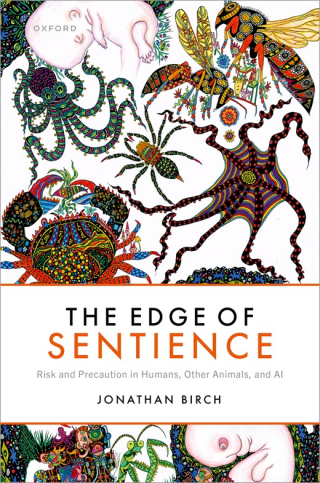 Speakers:
Speakers:
Jonathan Birch (London School of Economics)
Stevan Harnard (Université du Québec à Montréal)
Jonathan Kimmelman (McGill)
Martin Gibert (Université de Montréal/CRÉ)
Chair: Virginie Simoneau-Gilbert (University of Oxford)
Book summary:
Can octopuses feel pain and pleasure? What about crabs, shrimps, insects or spiders? How do we tell whether a person unresponsive after severe brain injury might be suffering? When does a fetus in the womb start to have conscious experiences? Could there even be rudimentary feelings in miniature models of the human brain, grown from human stem cells? What about AI?
These are questions about the edge of sentience, and they are subject to enormous, disorienting uncertainty. The stakes are immense, and neglecting the risks can have terrible costs. We need to err on the side of caution, yet it’s often far from clear what ‘erring on the side of caution’ should mean in practice. When are we going too far? When are we not doing enough?
The Edge of Sentience presents a precautionary framework designed to help us reach ethically sound, evidence-based decisions despite our uncertainty.
Making road safety moral – a brief history of arguing about seatbelts, helmets, and drunk-driving in Britain
October 17th, 2024 from 12h00-13h00 EST
Hybrid - Room 1140 2001 McGill College, 11th floor or on ZOOM
Speaker:
 Janet Weston is an Associate Professor at the London School of Hygiene and Tropical Medicine and Director of the LSHTM Centre for History in Public Health. Her research interests include histories of psychiatry and mental health, HIV/AIDS, prison healthcare, and health law, and her most recent book Looking after Miss Alexander: care, mental capacity, and the Court of Protection in mid-twentieth-century England came out last year with McGill-Queens University Press and received the 2024 J. Willard Hurst prize honorable mention. Her current research, funded by the Wellcome Trust, explores twentieth century public health law in Britain and also aims to develop better connections between the humanities and public health.
Janet Weston is an Associate Professor at the London School of Hygiene and Tropical Medicine and Director of the LSHTM Centre for History in Public Health. Her research interests include histories of psychiatry and mental health, HIV/AIDS, prison healthcare, and health law, and her most recent book Looking after Miss Alexander: care, mental capacity, and the Court of Protection in mid-twentieth-century England came out last year with McGill-Queens University Press and received the 2024 J. Willard Hurst prize honorable mention. Her current research, funded by the Wellcome Trust, explores twentieth century public health law in Britain and also aims to develop better connections between the humanities and public health.
Abstract:
In this talk, Professor Westin will discuss how and why road safety came to be seen as a ‘public health’ issue in Britain from the 1960s onwards, and the associated battle that took place concerning the morality of legislating about seatbelts, motorcycle helmets, and drunk-driving. The debates surrounding these innovations make up a valuable case study that demonstrates the role of morality within public health. As she will show, processes of moralization in relation to road safety were operating in several different ways: in the identification of the ‘public health problem;’ in the framing of opposition to new legislation on the basis of individual freedom; and in the arguments that road safety advocates then formulated to infuse decisions about road-related behaviours with moral weight, expanding the parameters of moral responsibility. Professor Weston will conclude with a few reflections on how this might inform debates and decisions surrounding public health law today.
Preventing youth homelessness
October 11th, 2024 12-13h30 PM EST
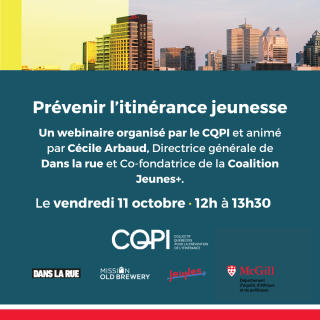
Online Webinar
Join the Québec Homelessness Prevention Policy Collaborative (QHPPC) on Friday, October 11th, from 12:00 to 1:30 PM, for an inspiring discussion featuring Cécile Arbaud, Executive Director of Dans la rue and co-founder of the Coalition Jeunes+, alongside youth from the Jeunes+ Committee. Together, drawing from their lived experiences, research, and field knowledge, they will provide an update on youth homelessness prevention in Quebec: where we currently stand, what is already in place, and how we can advance further.

LALONDE@50: How can we move the needle on equitable health promotion?
May 14-15 in a hybrid format, via Zoom and in person at the Centre Mont-Royal in Montréal, Québec
This event is free of charge and will include simultaneous French-English translation.
ABOUT:
Lalonde@50
The Department of Equity, Ethics, and Policy (DEEP) of the McGill School of Population and Global Health welcomes you to our annual research to policy conference - Lalonde@50: How can we move the needle on equitable health promotion?
In 1974, Marc Lalonde, then Canadian Minister of Health and Welfare, released the authoritative A New Perspective on the Health of Canadians. He proposed a wide-ranging, holistic view of “health” that went far beyond traditional medical responses to acute conditions and chronic illnesses. His emphasis on preventive measures is widely hailed as ushering in the concept of “health promotion” as well as laying the foundations for a new interest in the social determinants of health both within Canada and internationally.
On the 50th anniversary of the publication of A New Perspective, this conference seeks to re-examine the impact and legacy of the Lalonde Report from multiple disciplinary perspectives - and look beyond the report to consider how public health has evolved and where it is headed.
Through a mix of keynote plenary presentations, break-out discussions, and a set of “policy workshops,” this conference will share the latest evidence and engage speakers and participants in identifying what it will take to address the causes of homelessness and exploring solutions to prevent it.
Why you should attend
Lalonde@50 will be a unique opportunity to engage with researchers, students, public health, community, and policy leaders to discuss the history and legacy of Marc Lalonde’s ground-breaking report, and to critically assess how far we have come in building a society that produces health, not sickness, The conference will feature a mix of keynote and panel presentations and discussions, sharing the latest evidence, best practice, and engage speakers and conference participants in proposing and assessing the feasibility of concrete strategies for moving the needle on equitable health promotion. Lalonde@50 will also engage future scholars from across disciplines in a unique experiential learning opportunity in moving research to policy and include policy project presentations by DEEP undergraduate and graduate trainees.
Confirmed Keynote speakers include (in order of appearance in the program):
- The Honourable Dr. Carolyn Bennett, Ambassador-designate to Denmark
- Dr. Luc Boileau, Québec National Director of Public Health
- Dr. Mylène Drouin, Regional Public Health Director of Montreal
- Katherine Frohlich, Scientific Director of the Institute of Population and Public Health Canadian Institutes of Health Research
Partner organizations
The event is being co-hosted by the CIHR Institute of Population and Public Health, the National Collaborating Centre for Healthy Public Policy, the National Collaborating Centre for Determinants of Health, the Montreal Regional Public Health Department, and the Association pour la Santé Publique du QC, and is sponsored by the McGill Institute for the Study of Canada and supported in parts thanks to funding from the Canada Research Chairs Program.
The McGill-UofT Wellbeing Seminar (MUWS) series will feature presentations and panel discussions from leading wellbeing researchers across a variety of disciplines. Wellbeing research is expanding quickly and receiving increased interest from policy-makers and the public, however as a research community we are spread widely across institutions, and most do not have the critical mass of researchers to host their own seminar series in wellbeing research. Conveniently scheduled for researchers in the Americas and accessible to Europe and other time zones, we have conceived the Wellbeing Seminar to fill this gap and foster collaboration among researchers across career-stages and the globe.
Schedule:
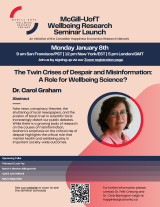 January 8th - Carol Graham. The Twin Crises of Despair and Misinformation: A Role for Wellbeing Science?
January 8th - Carol Graham. The Twin Crises of Despair and Misinformation: A Role for Wellbeing Science?
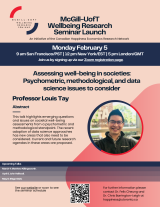 February 5th - Louis Tay. Assessing well-being in societies: Psychometric, methodological, and data science issues to consider
February 5th - Louis Tay. Assessing well-being in societies: Psychometric, methodological, and data science issues to consider
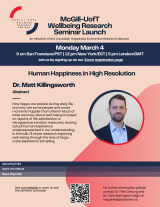 March 4th - Matthew Killingsworth. Human Happiness in High Resolution
March 4th - Matthew Killingsworth. Human Happiness in High Resolution
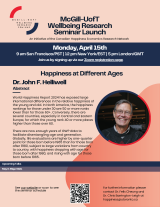 April 15th - John Helliwell - Happiness at Different Ages
April 15th - John Helliwell - Happiness at Different Ages
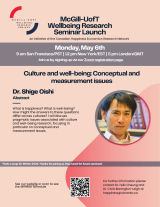 May 6th - Shige Oishi - Culture and well-being: Conceptual and measurement issues
May 6th - Shige Oishi - Culture and well-being: Conceptual and measurement issues
Did you miss one of the webinars? Recordings can be viewed on their website.
Conversations on Climate Justice – Perspectives from Canada and the Caribbean Webinar Series
The Role and Experience of Youth in Promoting Climate Justice
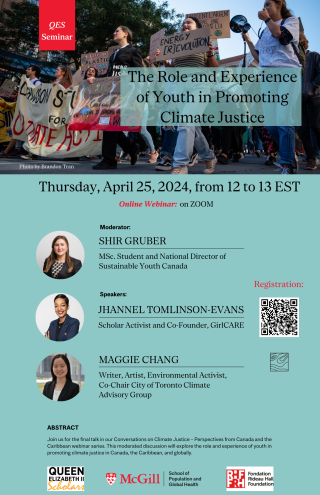 April 25, 2024 12-13 EST
April 25, 2024 12-13 EST
Only on ZOOM
Abstract:
Join us for the final talk in our Conversations on Climate Justice – Perspectives from Canada and the Caribbean webinar series. This moderated discussion will explore the role and experience of youth in promoting climate justice in Canada, the Caribbean, and globally.
Moderator:
Shir Gruber
MSc. Student and National Director of Sustainable Youth Canada
Biography: Shir Gruber has a bachelor of science in Hydrology with a minor in Geographic Information Systems at McGill University. She is completing a Master’s of Science at McGill studying wetlands as Nature-based Solutions. Her interest resides in empowering communities from the roots up and mitigating climate change.
She was co-president of Dawson College’s environmental club in 2019 co-leading the Montreal climate marches, was a TEDxYouth speaker, published work detailing a framework to implement grassroots environmentalism in academic settings, and was the regional co-director of Sustainable Youth Canada (SYC) in Montreal before entering her role as national co-director. She has been recognized as one of the Top 25 under 25 environmentalists in Canada by the Starfish Foundation.
Shir has conducted research contributing to changing a college’s policy on waste management impacting over 10,000 people, conducted research about bioremediation, invasive species and Climate Justice in Montreal, and conducted research in the Caribbean on the subject of agricultural adaptations to climate change at the University of West Indies through the Queen Elizabeth Scholars program. She serves on the Natural Resources Canada Youth Council where she is consulting Canada’s minister of natural resources on a just green transition.
Speakers:
Maggie Chang
Writer, Artist, Environmental Activist, Co-Chair City of Toronto Climate Advisory Group
Biography: Maggie is a poet, writer, and artist whose environmental journey started in first grade when she learned about deforestation of the Amazon in school. Since then, Maggie has led campus secondhand clothing sales for sustainable fashion, organized a UN Sustainable Development Goal training, and helped establish EcoSchools Canada’s Youth Advisory Council, leading her to be named one of the first WWF Canada Living Planet Leaders and a Top 25 Under 25 Environmentalist in Canada. With a Bachelor of Environmental Studies, Maggie is passionate to be living her values to build an intersectional environmental movement as part of the 2022-2023 Natural Resources Canada Youth Council and the City of Toronto Climate Advisory Group. She is particularly honoured to have had the opportunity to practice international solidarity working with Fairtrade Organic Café Femenino Coffee communities in Peru during the summer of 2019.
Jhannel Tomlinson-Evans
Scholar Activist and Co-Founder, GirlCARE
Biography: Jhannel Tomlinson is a Ph.D. candidate in the Department of Geography and Geology, at the University of the West Indies in Jamaica. Her research seeks to assess the capacity of Community-based Organizations (CBOs) to effectively support current and future climate change adaptation initiatives. She has published academic papers on the preliminary findings of her work and has also been a part of multi-disciplinary teams, conducting research on agriculture, climate change and rural development.
In addition to her academic work, she is a youth climate activist who is a member of the Caribbean Youth Environment Network (CYEN), Jamaica and is co-founder of Young People for Action on Climate Change (YPACC), Jamaica. She was a youth delegate at the Youth Climate Change Conference held in Kingston, 2017 and was a co-organizer in the local Rise for Climate event held in September 2018, which brought together youth participants who revealed their fears, concerns and recommendations as it relates to climate change.
Her involvement in climate action both through academia and activism, led to her being selected as the Jamaican Youth delegate to attend the 24th Conference of the Parties to the United Nations Framework Convention on Climate Change, (COP24) held in Katowice, Poland in December 2018. During this conference, she was engaged in intense discussions and was invited to present on the factors contributing to the involvement of youth as change agents in the fight for a sustainable future. Since her involvement in the COP, she has been asked to participate in a host of local events including lectures, presentations and panel discussions.
She is currently a lead organizer for the Post-COP Youth Consultations being organized by the Climate Change Division (CCD) of the Ministry of Economic Growth and Job Creation and was recently invited to attend the United Nations Economic and Social Council (ECOSOC) Youth Forum, the most institutionalized avenue for youth participation in the work of the United Nations, scheduled for April this year.
The poise and passion of this young lady in taking a stand against climate change, helps to showcase that the youth have a critical role to play and if we all work together, we can raise ambition, accelerate climate solutions and help to create a more sustainable future for Jamaica.
Prévention de l’itinérance : les dernières avancées 2024 - de la recherche aux politiques publiques
le 19 avril, 2024 - 10h - 17h
En ligne sur ZOOM
Le Département d'équité, d'éthique et de politiques de l'Université McGill et la Mission Old Brewery ont le plaisir de vous inviter à la conférence annuelle (en ligne) du Collectif québécois pour la prévention de l'itinérance (CQPI): Prévention de l'itinérance: Les dernières avancées 2024 – de la recherche aux politiques publiques.
Cette conférence présentera deux webinaires avec la participation d'experts internationaux en provenance de Finlande, du Royaume-Uni et de la Province du Manitoba. Le premier abordera le thème de la prévention des évictions, tandis que le second traitera des allocations logement, les deux jouant un rôle crucial dans la prévention de l'itinérance.
Trois de nos groupes de travail (Santé mentale, Droit au logement, Processus judiciaires et correctionnels) partageront également leurs dernières avancées au sein de salles de discussion dédiées.
Cet événement est gratuit, et une traduction simultanée sera disponible.
The Latest in Homelessness Prevention 2024: From Research to Policy
April 19, 2024 - 10:00-17:00
Online over ZOOM
The McGill Department of Equity, Ethics and Policy and the Old Brewery Mission are delighted to invite you to the annual conference of the Quebec Homelessness Prevention Policy Collaborative (Q-HPPC): The Latest in Homelessness Prevention 2024: From Research to Policy.
This online conference will feature two webinars with international presenters from Finland, the UK, and the Province of Manitoba. The first webinar will address eviction prevention, while the second will focus on housing benefits; both playing a crucial role in preventing homelessness.
Additionally, in breakout rooms, three of the Q-HPPC’s working groups (Mental Health, Justice/Corrections, and Right to Housing) will present their latest advances.
The event is free of charge, and simultaneous translation will be available.
Conversations on Climate Justice – Perspectives from Canada and the Caribbean Webinar Series
Bringing Equity and Justice into Climate Governance and Decision-Making
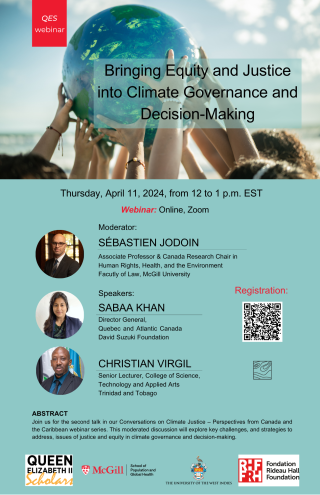 April 11, 2024 - 12:00-13:00 EST
April 11, 2024 - 12:00-13:00 EST
Webinar on Zoom
Abstract:
Join us for the second talk in our Conversations on Climate Justice – Perspectives from Canada and the Caribbean webinar series. This moderated discussion will explore key challenges, and strategies to address, issues of justice and equity in climate governance and decision-making.
Moderator:
Associate Professor & Canada Research Chair in Human Rights, Health, and the Environment
Faculty of Law, McGill University
Speakers:
Director General, Quebec and Atlantic Canada
David Suzuki Foundation
Christian Virgil:
Senior Lecturer,
College of Science, Technology and Applied Arts
Trinidad and Tobago
Biography: Christian Virgil is an enthusiastic advocate for environmental and occupational health. Currently pursuing his Ph.D. in Industrial Engineering, Christian is a Senior Lecturer in Environmental and Sustainability Studies and has a diverse academic background in public health and business administration. His research is centred on assessing climate-related risks and developing adaptation strategies within organisations. He is also known for his contributions to academic discourse on climate risk through several publications and conference papers. He was recently selected to be a part of the International Standards Organisation Working Group tasked with developing organisational guidelines for managing occupational health and safety risks arising from climate change and climate action. His participation in the Working Group underscores his commitment to shaping global policies for a safer and more sustainable future. It also demonstrates his commitment to advocating for change in response to environmental challenges.
Conversations on Climate Justice – Perspectives from Canada and the Caribbean Webinar Series
Migration and Climate Justice
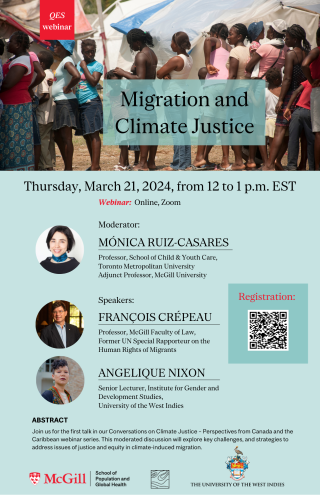 March 21st, 2024 - 12:00-13:00 EST
March 21st, 2024 - 12:00-13:00 EST
Webinar - On ZOOM
Abstract:
Join us for the first talk in our Conversations on Climate Justice – Perspectives from Canada and the Caribbean webinar series. This moderated discussion will explore key challenges and strategies to address issues of justice and equity in climate-induced migration.
Moderator:
Mónica Ruiz-Casares
Professor, School of Child & Youth Care, Toronto Metropolitan University
Adjunct Professor, McGill University
Speakers:
François Crépeau
Professor, McGill Faculty of Law
Former UN Special Rapporteur on the Human Rights of Migrants
Angelique Nixon
Senior Lecturer, Institute for Gender and Development Studies
University of the West Indies
Challenging health inequalities research from a “sociological imagination”
March 14th 1:30-2:30 PM EST
2001 McGill College, 11th floor, room 1140 or via ZOOM
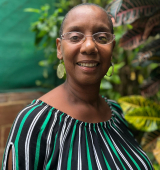 Dennis Pérez Chacón, MSc, PhD.
Dennis Pérez Chacón, MSc, PhD.
Senior researcher & Associate professor
Epidemiology Unit, Research, Diagnosis and Reference Center (CIDR)
Pedro Kourí Institute of Tropical Medicine (IPK), Havana, Cuba
Speaker Bio: Dennis Pérez is a sociologist (Havana University, 1997); with postgraduate training on popular education, participatory action research, disease control (Master degree, ITM, 2004) and social development (Master degree, Havana University, 2007), among others. She holds a PhD in Sociology (Havana University, 2011) and in Health Sciences (Gent University, 2015). She completed a postdoctoral fellowship at the Public Health Research Institute of University of Montreal (2016-2019).
Since 1997 she has worked as researcher at the Epidemiology Division of Pedro Kourí Institute of Tropical Medicine (IPK), Havana, Cuba. She has been working for nearly 10 years on building evidence on empowerment strategies for dengue prevention and control in the Cuban context. Her focus has been the dynamics of empowerment processes at small scale and the factors that could influence these processes when moving from micro to macro implementation. Based on her empirical, mainly qualitative, research and on her sociological background, and together with her colleagues, she has brought theoretical developments on the concept of participation and on some implementation issues.
Over the years, her research interest and efforts have shifted to better on how socio-political context and individual equity dimensions (e.g., health access, gender, race/ethnicity, and income) explain health gaps.
Abstract: During the seminar Dr. Pérez Chacón will illustrate challenges, opportunities, and advances on health inequalities research, sharing examples from empirical research on prevention and control of infectious diseases (e.g., Dengue, Tuberculosis, HIV/AIDS and SARS-CoV-2/COVID-19), using unconventional methodologies. The seminar will include a perspective of research through her own scholarly journey as Afro-Latina, working on different diseases and research contexts, and within a particular set of theoretical and methodological resources. The idea is to challenge current definitions and concepts or approaches on health inequalities research and share the contributions from a complementary sociological background, a participatory paradigm, reflexivity and transdisciplinary, into new alternatives of practicing research in Public Health.
This event is cohosted by the Department of Epidemiology, Biostatistics and Occupational Health and the Department of Equity, Ethics and Policy.
2023 Events
The McGill-UofT Wellbeing Seminar (MUWS) series will feature presentations and panel discussions from leading wellbeing researchers across a variety of disciplines. Wellbeing research is expanding quickly and receiving increased interest from policy-makers and the public, however as a research community we are spread widely across institutions, and most do not have the critical mass of researchers to host their own seminar series in wellbeing research. Conveniently scheduled for researchers in the Americas and accessible to Europe and other time zones, we have conceived the Wellbeing Seminar to fill this gap and foster collaboration among researchers across career-stages and the globe.
Schedule:
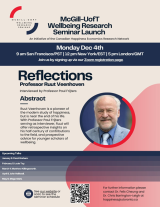 December 4th - Ruut Veenhoven. Reflections on a half-century of wellbeing research
December 4th - Ruut Veenhoven. Reflections on a half-century of wellbeing research
Did you miss one of the webinars? Recordings can be viewed on their website.
Championing Change: Pediatric Surgeons Practicing Across Borders
Engaging with future leaders and advocates
 December 05, 2023, 10-11am (EST) - Online via ZOOM
December 05, 2023, 10-11am (EST) - Online via ZOOM
Speakers:
Sherif Emil, MD,CM, FRCSC, FACS, FAAP
The Montreal Children's Hospital | McGill University Health Centre
Chethan Sathya, MD, MSc, FRCSC, FACS
Cohen Children's Medical Center - Northwell Health
Cohosted by The McGill Observatory on Health and Social Services Reforms, the Department of Equity, Ethics and Policy and the Department of Family Medicine.
Sponsored by Dr. John T. Davidson to promote understanding of comparative healthcare systems and their effect on the work of physicians.
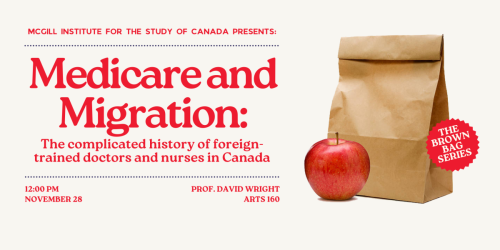 When: November 28, 2023 - 12:00-1:00
When: November 28, 2023 - 12:00-1:00
Where: Arts Building room 160
The MISC Brown Bag series is back! Bring your lunch and join us for a relaxed talk given by Professor David Wright on Medicare and Migration: The complicated history of foreign-trained doctors and nurses in Canada.
Hot drinks and snacks will be served. No registration necessary.
Abstract: Journalists and policy experts have recently asserted that Canadian Medicare is in an “unprecedented” crisis, one that can only be resolved by the licensing of thousands of foreign-trained health care practitioners. Indeed, the Conservative Party of Canada, which polls suggest is increasingly likely to form the next federal government, has recently unveiled a “Blue Seal” proposal to fast-track the licensing of foreign-trained doctors and nurses. The goal is to address, or even to eliminate, the nearly six million Canadians who report not having a primary care practitioner. Although this initiative has been framed as a necessary measure to alleviate a recent phenomenon, this talk will argue exactly the opposite: that Medicare in Canada was conceived and sustained over the last 50 years by the backfilling of underserviced areas and specialties through the licensing of foreign-trained (and largely foreign-born) practitioners. This presentation examines the history of Medicare, demonstrating how the keystone of Canadian welfare state nationalism was built and sustained by health care practitioners who “came from away”.
David Wright is Professor of History and Canada Research Chair in the History of Health Policy at McGill University. A specialist in the social history of modern health and medicine, he has published several books on the history of psychiatry, children’s health and disability, the development of hospitals, and, more recently, the history of Canadian Medicare. His most recent book (with Sasha Mullally), Foreign Practices: Immigrant Doctors and the History of Canadian Medicare, was published by McGill-Queen’s University Press, in 2020.
Housing, Human Rights and Public Health
What’s Law Got to Do With It?
Friday, November 3, 2023, from 11:00 to 12:30 p.m.
Hybrid - 2001 McGill College Avenue, Room 1201 (12th floor) or Via ZOOM
Speakers:

Lara Khoury
Full Professor, Faculty of Law, McGill University

Alana Klein
Associate Professor, Faculty of Law, McGill University
Moderated by:
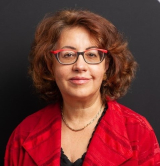
Pearl Eliadis
Associate Professor (professional), Max Bell School of Public Policy, McGill University
Abstract:
Housing in Canada is in crisis. A flurry of multiple— and often conflicting —program and policy solutions are proposed, literally on a daily basis, by politicians, policy makers, the private sector and civil society. But underpinning all these interventions and our capacity to prioritize them, is a fundamental imperative: that until the legal basis of the right to adequate housing is recognized and justiciable, none of these initiatives will have the resilience or legitimacy needed to ensure sustainable and progressive realization of the right to adequate housing. This seminar will discuss how Canadian law approaches the justiciability of socio-economic rights and will discuss the varied legal tools that are generally available to decision-makers as well as civil society to promote favourable public health outcomes.
Cohosted by the Dept. of Equity, Ethics and Policy; McGill Research Group on Health and Law; the Quebec Homelessness Prevention Policy Collaborative; and McGill Centre for Human Rights and Legal Pluralism.
Encouraging Preventative Care to Manage Chronic Disease at Scale
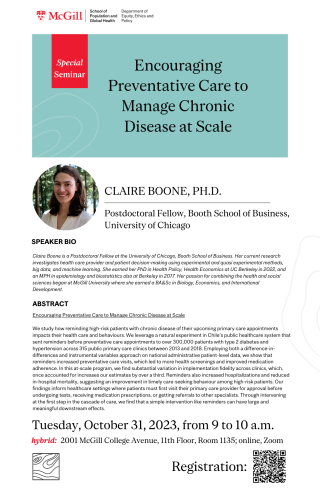 Tuesday, October 31, 2023, from 9 to 10 a.m.
Tuesday, October 31, 2023, from 9 to 10 a.m.
Hybrid - 2001 McGill College Avenue, 11th Floor, Room 1135; online, Zoom
Abstract:
Encouraging Preventative Care to Manage Chronic Disease at Scale
We study how reminding high-risk patients with chronic disease of their upcoming primary care appointments impacts their health care and behaviours. We leverage a natural experiment in Chile’s public healthcare system that sent reminders before preventative care appointments to over 300,000 patients with type 2 diabetes and hypertension across 315 public primary care clinics between 2013 and 2018. Employing both a difference-in-differences and instrumental variables approach on national administrative patient-level data, we show that reminders increased preventative care visits, which led to more health screenings and improved medication adherence. In this at-scale program, we find substantial variation in implementation fidelity across clinics, which, once accounted for increases our estimates by over a third. Reminders also increased hospitalizations and reduced in-hospital mortality, suggesting an improvement in timely care-seeking behaviour among high-risk patients. Our findings inform healthcare settings where patients must first visit their primary care provider for approval before undergoing tests, receiving medication prescriptions, or getting referrals to other specialists. Through intervening at the first step in the cascade of care, we find that a simple intervention like reminders can have large and meaningful downstream effects.
Speaker: Claire Boone, PH.D.
Postdoctoral Fellow, Booth School of Business,
University of Chicago
Claire Boone is a Postdoctoral Fellow at the University of Chicago, Booth School of Business. Her current research investigates health care provider and patient decision-making using experimental and quasi experimental methods, big data, and machine learning. She earned her PhD in Health Policy, Health Economics at UC Berkeley in 2022, and an MPH in epidemiology and biostatistics also at Berkeley in 2017. Her passion for combining the health and social sciences began at McGill University where she earned a BA&Sc in Biology, Economics, and International Development.
Consent, Pelvic Exams, and Medical Training
A Film Screening and Panel Discussion
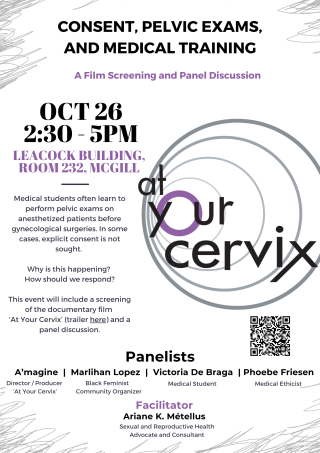 Thursday, October 26, 2023, from 2:30-5:00 p.m.
Thursday, October 26, 2023, from 2:30-5:00 p.m.
Leacock Building, Room 232 (855 Sherbrooke St W, Montreal, Quebec H3A 2T7)
Abstract:
Medical students often learn to perform pelvic exams on anesthetized patients before gynecological surgeries. In some cases, explicit consent is not sought. Why is this happening? How should we respond?
Recent years have seen increased attention on the topic of consent for intimate exams performed by medical trainees on patients under anesthesia, both in the media and in peer-reviewed literature. In the United States, legislation requiring consent for pelvic and other intimate exams has been signed into law in over 20 states. Canadians have been largely silent on this issue since a brief discussion took place over a decade ago. This event will initiate a national conversation about the topic of consent and intimate educational exams. A screening of the documentary ‘At Your Cervix’, which examines the history of this topic in the US, will be followed by a brief presentation of recent data collected from medical students across Canada.
This event will include a screening of the documentary film ‘At Your Cervix’ (trailer here) and a panel discussion.
Panelists:
A’magine - Director - Producer ‘At Your Cervix’
 A’magine has been teaching and speaking about feminism and sexuality for over two decades. As a queer sexuality educator, A’magine wanted to impact people who were entering the field of medicine about sexuality and gender.
A’magine has been teaching and speaking about feminism and sexuality for over two decades. As a queer sexuality educator, A’magine wanted to impact people who were entering the field of medicine about sexuality and gender.
She earned her Master’s degree in Human Sexuality Education at New York University and studied film at New School University. She delivered her TEDx talk “Owning Your Sexual Power” in Napa Valley and was named one of GO! Magazine’s “100 Women We Love.”
She developed, wrote and hosted over 60 episodes of a women’s sexuality program on the Pseudo Streaming Network. She co-wrote and produced the sold-out play Vulvalution in New York’s downtown theatre community. A’magine is author of Woman on Fire and co-author of Lesbian Sex Secrets for Men. She worked as a Gynecological Teaching Associate for 10 years in New York City and At Your Cervix is her first feature film.
Marlihan Lopez - Black Feminist / Community Organizer
 © Concordia University, photo by Lisa Graves
© Concordia University, photo by Lisa Graves
Marlihan Lopez is a Black feminist community organizer tackling issues surrounding anti-blackness, gender-based violence and its intersections. She coordinated the EDI (equity, diversity, inclusion) division for the Quebec Coalition of Rape Crisis Centres, where she did advocacy work and raises awareness on how gender, race, class and ability intersect in the context of sexual violence. She has also organized with movements such as Black Lives Matter around issues such as racial profiling and police brutality. She was co-Vice-President for la Fédération des femmes du Québec from 2017-2022 and is currently Program and Outreach Coordinator at the Simone de Beauvoir Institute. She is also cofounder of Harambec: Reviving the Black Feminist Collective.
Victoria De Braga - Medical Student
 Victoria De Braga is a fourth-year medical student and is co-president of the MSS Obstetrics and Gynecology Interest Group at McGill University. She is passionate about issues related to patient advocacy, consent, gender, and women’s reproductive health. She hopes to contribute to the public’s awareness regarding sensitive pelvic examinations and any silent suffering experienced by people involuntarily placed in this position.
Victoria De Braga is a fourth-year medical student and is co-president of the MSS Obstetrics and Gynecology Interest Group at McGill University. She is passionate about issues related to patient advocacy, consent, gender, and women’s reproductive health. She hopes to contribute to the public’s awareness regarding sensitive pelvic examinations and any silent suffering experienced by people involuntarily placed in this position.
Phoebe Friesen - Medical Ethicist
 Phoebe Friesen is a philosopher and medical ethicist, working within the Department of Equity, Ethics, and Policy and the Department of Social Studies of Medicine at McGill University. Her work engages with ethical and epistemic issues related to the production and implementation of knowledge in the health sciences, drawing on feminist philosophy of science, ethics scholarship, and methodologies from the social sciences. She has been writing about, and advocating for, the importance of explicit consent for educational intimate exams since 2018. See the following examples of her work:
Phoebe Friesen is a philosopher and medical ethicist, working within the Department of Equity, Ethics, and Policy and the Department of Social Studies of Medicine at McGill University. Her work engages with ethical and epistemic issues related to the production and implementation of knowledge in the health sciences, drawing on feminist philosophy of science, ethics scholarship, and methodologies from the social sciences. She has been writing about, and advocating for, the importance of explicit consent for educational intimate exams since 2018. See the following examples of her work:
Educational pelvic exams on anesthetized women: Why consent matters
Consent for Intimate Exams on Unconscious Patients: Sharpening Legislative Efforts
Facilitator:
Ariane K. Métellus - Sexual and Reproductive Health / Advocate and Consultant
 Ariane K. Métellus is a social entrepreneur, consultant, speaker, birth and perinatal worker. Ariane K is passionate about perinatal, sexual and reproductive health, more specifically obstetrical and gynaecological violence and systemic racism in Quebec’s health care system. She works with the College des médecins du Québec as a member of the working group on an introduction training on cultural safety in medicine. She is the Regional Recruitment Coordinator for the province of Quebec and sits on the steering council committee of The RESPCCT Study (Research Examining Stories of Pregnancy and Childbearing in Canada Today) at UBC's Birth Place Lab, on Breast Cancer Action Quebec’s board and on the steering committee of La CORPS féministe.
Ariane K. Métellus is a social entrepreneur, consultant, speaker, birth and perinatal worker. Ariane K is passionate about perinatal, sexual and reproductive health, more specifically obstetrical and gynaecological violence and systemic racism in Quebec’s health care system. She works with the College des médecins du Québec as a member of the working group on an introduction training on cultural safety in medicine. She is the Regional Recruitment Coordinator for the province of Quebec and sits on the steering council committee of The RESPCCT Study (Research Examining Stories of Pregnancy and Childbearing in Canada Today) at UBC's Birth Place Lab, on Breast Cancer Action Quebec’s board and on the steering committee of La CORPS féministe.
Her background has led her to examine the importance we give to the experience of marginalized women, particularly black and racialized women in Quebec's health care system, specifically concerning sexual and reproductive health and during the perinatal period.
Through her work, she hopes to raise awareness, inform and support these women, assert their rights to all those who work closely or remotely with them, and participate in the recognition of the various issues that concern them by institutions and the various communities affected by these realities.
Her work is rooted in love!
Sponsored by:
Medical Class of 1970
Department of Equity, Ethics, and Policy
Department of Social Studies of Medicine
Centre de Recherche en Éthique
Faculty of Medicine and Health Sciences
Institute for Gender Sexuality and Feminist Studies
Office for Sexual Violence Response Support and Education
iMPACTS
Research Group on Health Law
McGill Obstetrics and Gynecology Interest Group
Feminism in Medicine Club
Whole Person Care Interest Group
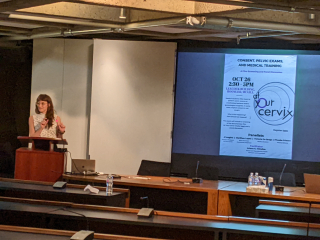
Data ethics and mental health workshop
WHEN: Friday, Oct 6th, 2023, from 9:00 to 5:00 p.m.
WHERE: 2001 McGill College Ave., 12th floor - Room 1201 or via ZOOM
ABSTRACT:
Canada Research Chair in Data Ethics and Dept. of Equity, Ethics and Policy Associate Member, Eran Tal, will be hosting an all day workshop on Data Ethics and Mental Health. With Keynote presentation by Jo Henderson (Centre for Addiction and Mental Health, Youth Wellness Hubs Ontario, and University of Toronto). Discussion includes Ethical Iterations in Psychosocial Measurement and The Need for Epistemic Humility amongst many others.
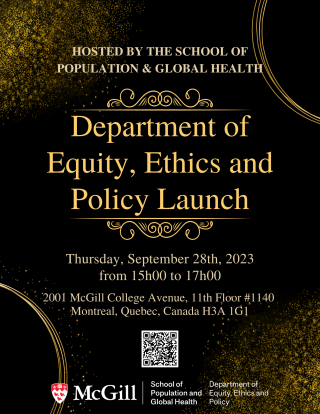
Now what? Global health between COVIDs
Friday, September 22, 2023 - from 15h00 to 16h30
Hybrid - 2001 McGill College Avenue, Room 1135 (11th floor) or Via ZOOM

Anat Rosenthal, Ph.D.
Department of Health Policy and Management, Ben-Gurion University of the Negev
Speaker Bio:
Anat Rosenthal is a Medical Anthropologist and a Senior Lecturer at the Department of Health Policy and Management, School of Public Health, Faculty of Health Sciences and the Tamar Golan Africa Center at Ben- Gurion University of the Negev. Her research focuses on global health policy and healthcare delivery in resource-limited environments.
Rosenthal completed her PhD in Anthropology at the Hebrew University of Jerusalem (2009) and was a Fulbright Fellow at the Department of Global Health and Social Medicine at Harvard Medical School (2009-2010). She was also a Lady Davis Fellow at the Hebrew University of Jerusalem (2011-2012), and an MHERC Fellow at the Institute for Health and Social Policy and Centre de recherche en éthique (CRÉ) at McGill University (2012-2015). She has conducted fieldwork in Israel, Malawi and Zimbabwe on the social and cultural effects of AIDS, healthcare delivery in resource-limited settings, the impact of climate changes on health services, national and international health policy, and undocumented migration.
Rosenthal’s work has been published in journals in medical anthropology, public health, and medicine, and her book on the rollout of HIV care in Malawi titled Health on Delivery: The Rollout of Antiretroviral Therapy in Malawi was published by Routledge in 2017.
Abstract:
Almost four years into COVID-19, the dust is settling on the impact of the pandemic on global health theory and practice, and the lessons (not)learned. Drawing from ongoing research projects, and personal observations and frustrations, this paper reflects on global health as an analytical framework and worldview through the lens of the impact of the COVID-19 pandemic on notions of the global community, history’s lessons, and solidarity.
February 15th, 2023 from 12-1 PM EST
Leacock Building room 808 (8th floor)
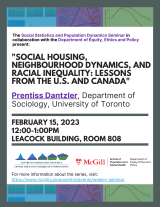 The Social Statics and Population Dynamics Seminar, in collaboraiton with the Department of Equity, Ethics and Policy present "Social Housing, Neighbourhood Dynamics, and Racial Inequality: Lessons from the U.S. and Canada" a talk with Dr. Prentiss Dantzler, Assistant Professor at University of Toronto whose research sits at the nexus of urban poverty, neighbourhood change, race and ethnic relations, housing and community development. As an interdisciplinary scholar, Dr. Dantzler explores how and why neighbourhoods change and how policymakers and communities create and react to those changes.
The Social Statics and Population Dynamics Seminar, in collaboraiton with the Department of Equity, Ethics and Policy present "Social Housing, Neighbourhood Dynamics, and Racial Inequality: Lessons from the U.S. and Canada" a talk with Dr. Prentiss Dantzler, Assistant Professor at University of Toronto whose research sits at the nexus of urban poverty, neighbourhood change, race and ethnic relations, housing and community development. As an interdisciplinary scholar, Dr. Dantzler explores how and why neighbourhoods change and how policymakers and communities create and react to those changes.
Speaker:
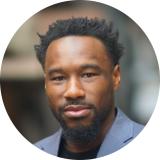 Dr. Prentiss Dantzler joined the University of Toronto as an Assistant Professor of Sociology in 2021. Previously, he held faculty appointments at Georgia State University (Urban Studies) and Colorado College (Sociology). He also served as a Canada-U.S. Fulbright Scholar at UT and as a Scholar-In-Residence at the Institute for Research on Poverty at the University of Wisconsin-Madison. He received his Ph.D. in Public Affairs with a concentration in Community Development from Rutgers University-Camden. He also holds an M.P.A. (Urban and Regional Planning) from West Chester University and a B.S. (Energy, Business and Finance) from Penn State University. His research sits at the nexus of urban poverty, neighbourhood change, race and ethnic relations, housing and community development. More information.
Dr. Prentiss Dantzler joined the University of Toronto as an Assistant Professor of Sociology in 2021. Previously, he held faculty appointments at Georgia State University (Urban Studies) and Colorado College (Sociology). He also served as a Canada-U.S. Fulbright Scholar at UT and as a Scholar-In-Residence at the Institute for Research on Poverty at the University of Wisconsin-Madison. He received his Ph.D. in Public Affairs with a concentration in Community Development from Rutgers University-Camden. He also holds an M.P.A. (Urban and Regional Planning) from West Chester University and a B.S. (Energy, Business and Finance) from Penn State University. His research sits at the nexus of urban poverty, neighbourhood change, race and ethnic relations, housing and community development. More information.
The Department of Equity, Ethics and Policy are co-hosting an event with CAnD3 and the CPD.
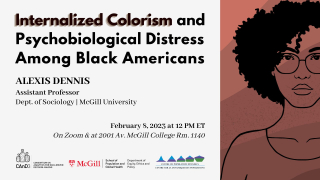 February 8th, 2023 12-1 PM ET
February 8th, 2023 12-1 PM ET
Internalized Colorism and Psychobiological Distress Among Black Americans
Speaker:
Alexis Dennis, Assistant Professor
Dept. of Sociology, McGill University
2022 EVENTS
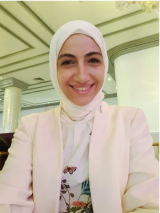 October 19th, 2022
October 19th, 2022
Pizza served from 12:00-12:30; Lecture from 12:30-13:30 EST
Hybrid Event
School of Population and Global Health
2001 McGill College Avenue
room 1140
Montreal, Quebec, Canada H3A 1G1
or via Zoom
The current evidence on marginalized adolescents: an intersectoral approach to inequalities, health, and public policy
Abstract:
Centered around a child-rights framework, this talk will provide recent evidence on social positions, their intersectionality, their inequalities, and their association with adolescent well-being; as well as provide current evidence that evaluates the role of structural and social actors in these domains.
Social inequalities span social conditions such as gender, race, ethnicity, poverty, material possessions, and visible minority status, among others. From an age-perspective, science is a homogeneous field where research is conducted by adults on children and adolescents; however, few include the adolescent’s perspective, voice, or contribution. Recent evidence indicates that there are social conditions that are specific to adolescents that place them at a health disadvantage. These include conditions such as relative deprivation, absolute income inequalities, living in a single-parent household, being involved in bullying behaviours, negative body size perceptions, citizenship status, disability status, and high smartphone use, to name a few. Disadvantageous social positions overlap in combinations making adolescent’s experiences and relationship with their health, unique. Although these social positions seem to be individual conditions of concerns, structural determinants, social policies, government ideologies, and international actors play prominent roles in social inequalities. When addressing social equity and justice, these adult-governed entities will need to consider new and different approaches to achieve healthier, more equitable societies.
Speaker:
Nour Hammami
Assistant Professor, Child and Youth Studies Trent University Durham
Biography:
Nour Hammami currently holds an Assistant Professor position in Child and Youth Studies at Trent University Durham in Ontario, Canada. The focus of her research lies at the intersection of investigations between social inequalities and adolescent’s health and well-being using innovative epidemiological designs and quantitative methods.
At the IHSP, Nour was a postdoctoral researcher focused on social inequalities in health among marginalized children and youth. She investigated the distinct mental and physical health disadvantage that marginalized social groups of youth are at, relative to the rest of the population. The groups of youth included: victimized and victimizing youth, youth living in low socioeconomic position, living in single-parent households, and non-majority groups including gender minorities, racial groups, visible minorities, etc. She used a variety of analytical skills in both cross-sectional and prospective study designs with Canadian and international study populations. Nour completed her PhD in Public Health and Health Systems at the University of Waterloo.
A central area of her research remains investigating disparities in health and understanding the structural, social, behavioural determinants that cause and that narrow these gaps using an equitable and inclusive approach. Nour acts as a reviewer for several journals and is a stakeholder with Health Canada.
 September 29th, 2022
September 29th, 2022Coffee & croissants from 10:30-11:00; Lecture from 11:00-12:00 EST
Hybrid Event
School of Population and Global Health
2001 McGill College Avenue
room 1135
Montreal, Quebec, Canada H3A 1G1
or via Zoom
Why Health Care Needs Melancholy Principles
Abstract:
How long and in what forms the multiple resistances to public health during the Covid pandemic will continue to reverberate remains uncertain. Health care professionals might dismiss the protests as nothing more than ill-informed epiphenomena of populist politics—not untrue—but that would evade a self-critique that can address both public and professional discontents that pre-date Covid. This lecture proposes one aspect of that critique.
The canonical principles of bioethics—autonomy, beneficence, non-maleficence, and justice—self-consciously reflected an Enlightenment ideal of a rational, unified self, and that idealization affects the expectations of both patients and professionals. Those principles explicitly perpetuate an individualistic conception of both the patient and the healthcare worker, and they leave little space for the recognition of anyone’s suffering. I propose instead melancholy principles; that is, principles that foreground relatedness of selves in mutual dependence, inevitable shortcomings in responses to suffering, and layers of structural inequity. What’s at stake is rebalancing what both ill people and healthcare professionals expect of themselves, of each other, and of the institutional system in which they are mutually embedded.
Speaker:
Arthur W. Frank, Ph.D., FRSC
Professor Emeritus, University of Calgary
Biography:
Arthur Frank is professor emeritus of sociology at the University of Calgary. Since retirement, he has been a visiting professor at VID Specialized University in Oslo and, most recently, in the Program in Narrative Medicine at Columbia University. His books include At the Will of the Body and The Wounded Storyteller, an Italian translation of which just appeared. His awards include the medal in bioethics from the Royal Society of Canada and the Lifetime Achievement Award from the Canadian Bioethics Society. His newest book, King Lear: Shakespeare’s Dark Consolations, will be published by Oxford University Press in November 2022.
CWKN Webinar Series:
September 27th, 2022 - 14:00 -15:30 EST via ZOOM
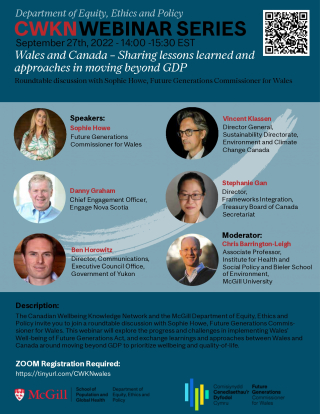 Wales and Canada – Sharing lessons learned and approaches in moving beyond GDP
Wales and Canada – Sharing lessons learned and approaches in moving beyond GDP
Roundtable discussion with Sophie Howe, Future Generations Commissioner for Wales
Description: The Canadian Wellbeing Knowledge Network and the McGill Department of Equity, Ethics and Policy invite you to join a roundtable discussion with Sophie Howe, Future Generations Commissioner for Wales. This webinar will explore the progress and challenges in implementing Wales’ Well-being of Future Generations Act, and exchange learnings and approaches between Wales and Canada around moving beyond GDP to prioritize wellbeing and quality-of-life.
Speakers:
Danny Graham:
Chief Engagement Officer – Engage Nova Scotia
Over a thirty-year period, Danny Graham has held senior positions in business, law, government, and politics. For 10 years he was the Chief Negotiator on Aboriginal Rights for the Province of Nova Scotia. He is credited with starting the Nova Scotia Restorative Justice Program and has worked to advance justice reforms with the United Nations and countries spanning four continents. He has been recognized by organizations throughout Atlantic Canada for his community and public service.
He is currently the Chief Engagement Officer for Engage Nova Scotia – an independent non-profit that is leading the Nova Scotia Quality of Life Initiative, with an extensive network of partners from the public, private, academic and community sectors – provincially, nationally, and internationally. In 2019 almost 13,000 Nova Scotians responded to a 230-question survey administered by Engage NS in cooperation with the Canadian Index of Wellbeing. With Dalhousie University, they have developed pioneering tools to extract the findings of the survey in real time across demographic and neighbourhood profiles. Partners in all three levels of government, are considering the findings of the survey and the use of the tools to catalyse new action, inform policy decisions and shape the narrative about how to build a successful society.
Ben Horowitz:
Communications Director with the Executive Council Office, Government of Yukon
With experience working across the public, private and not-for-profit sectors, Ben has focused his career in ways that help advance the goals of sustainable development. He is currently leading a project in partnership with the University of Waterloo’s Canadian Index of Wellbeing to help the Yukon ensure government decisions and actions are informed by wellbeing evidence and indicators. Prior to joining the Government of Yukon in 2015, Ben worked in the fields of renewable energy and agriculture in the greater Vancouver area and California. Ben is a dual US/Canadian citizen and holds a journalism degree from the University of Colorado at Boulder and a Master’s of Public Administration in Sustainable Management from Presidio Graduate School in San Francisco.
Sophie Howe:
Future Generations Commissioner of Wales
In 2015, Wales became the first nation to place the UN’s Sustainable Development Goals into law, through its ground-breaking Well-being of Future Generations Act, which established seven national well-being goal. At the same time Wales established a Future Generations Commissioner, Sophie Howe, with a remit set out in law to be “the guardian of the interests of future generations in Wales”. Sophie Howe’s role is to provide advice to the Government and other public bodies in Wales on delivering social, economic, environmental and cultural well-being for current and future generations and assessing and reporting on how they are delivering. Sophie has led high profile interventions around transport planning, education reform and climate change in Wales. Sophie has been advising various governments and the Secretary-General of the United Nations’ Office on proposals to update the UN’s governance to take into account the interests of future generations.
Vincent Klassen:
Director General, Sustainability Directorate
Environment and Climate Change Canada
Vincent leads Environment and Climate Change Canada’s Sustainability Directorate, responsible for integrated federal planning, reporting and performance measurement through the Federal Sustainable Development Strategy, the Canadian Environmental Sustainability Indicators and Strategic Environmental Assessments. He has held leadership roles at Global Affairs Canada and Natural Resources Canada, including diplomatic assignments to Paris and Berlin.
Vincent dirige la direction du développement durable à Environnement et changement climatique Canada, qui mène la planification, les rapports et la mesure de performance intégrée à l’échelle fédérale par l’entremise de la Stratégie fédérale du développement durable, les Indicateurs canadiens de durabilité environnementale et les évaluations environnementales stratégiques. Il a occupé des rôles de direction à Affaires mondiales Canada et Ressources naturelles Canada, y compris des affectations diplomatiques à Paris et Berlin.
Moderator:
Chris Barrington-Leigh:
Associate Professor, Institute for Health and Social Policy and Bieler School of Environment, McGill University
Chris Barrington-Leigh is an Associate Professor jointly appointed at the Institute for Health and Social Policy and the Bieler School of Environment. Originally trained in upper atmospheric and space plasma physics at M.I.T., Stanford, and Berkeley, Chris subsequently received a PhD in Economics at UBC. Chris' interests are focused on empirical and quantitative assessments of welfare, and their implications for economic, social, and environmental policy, including the pursuit of overall economic growth and material consumption expansion. In particular, his research makes use of subjective well-being reports to address the relative importance of social and community-oriented aspects of life as compared with material consumption. He uses large international as well as national surveys, experiments, and economic theoretical modeling to understand individual and aggregate consumption benefits. Chris was a Global Scholar of the Canadian Institute for Advanced Research (CIFAR), affiliated with CIFAR's research programme on Social Interactions, Identity and Well-Being.
The IHSP's Christopher Barrington-Leigh spoke at the ISQOLS 2022 Quality-of Life for Resilient Futures: Sustainability, Equity, & Wellbeing Conference.
August 3-6, 2022
Burlington, Vermont USA
Disrupted Lives: Pandemic Policies and Youth Wellbeing
June 7th - 11:00-13:00
June 10th - 10:00-14:00
June 14th - 10:00-14:00
June 17th - 11:00-13:00
Description:
There is growing concern for the mental health and wellbeing of youth across Canada and globally. “Youth” is always a challenging period of growth and transition – but it is clear that the last two “pandemic years” have been especially challenging for young people from diverse communities and countries around the world. The COVID-19 pandemic ushered in policies that affected youth, intentionally or incidentally, with mixed impacts. Governments worldwide and across Canada were forced to make critical decisions, quickly, with little evidence or knowledge of how the policy choices they made would impact diverse communities and populations. We are now seeing some of the impacts. There is not yet sufficient evidence on the short and long term effects, some impacts are evolving and much we still do not know, but it is clear that the impacts on young people have been significant – on their mental health, employment, relationships, education, and economic security. A growing number of research reports and surveys of young people across Canada point to disrupted futures, interrupted journeys and dreams, and times of confusion and insecurity in moments of transition that promise to have wide-ranging impacts for years to come. This conference will “take stock” of the policy choices that were made by different governments. Participants will look closely at what we now know, and don’t know, about the impact of those choices on diverse populations of youth and discuss important considerations for future policy that promotes and prioritizes youth wellbeing.
The Disrupted Lives conference, co-hosted by the McGill Department of Equity, Ethics and Policy, UNICEF Canada and the ListenUP for Youth Wellbeing initiative, will bring together young people, researchers, community organizations, policymakers across jurisdictions and international leaders to “take stock” of the impact of the COVID-19 pandemic and pandemic policies on youth. Through a mix of keynote plenary presentations, break-out discussions and a set of 4 moderated “policy sessions” focused on Education, Employment, Social Security and Public Health this conference will share the latest evidence, hear the perspectives and voices of youth and look critically at the policy choices that were made. Disrupted Lives will also engage speakers and participants in identifying priority policy considerations at this stage of the pandemic, and will highlight promising strategies for actively involving young people in shaping future policy.
Emerging Therapies for Orphan Diseases: Ethics and Economics
March 25th, 2022
10:00-13:00
Virtual Event
Summary:
The last decade has witnessed significant advances in regenerative medicines, particularly in the context of rare and hereditary diseases. Many such regenerative medicines are expensive and unlikely to fail traditional cost-utility analyses, thus placing heavy financial pressures on healthcare systems.
Until now, healthcare systems have been able to accommodate the costs of treating orphan diseases, given the small number of treatments available and the rarity of disease. However, as regenerative treatment approaches advance and precision medicine qualifies more and more patients as having orphan diseases, healthcare systems will face increasing challenges balancing the needs of patients with orphan diseases with those with more prevalent diseases.
This half-day symposium will bring together philosophers, health economists, clinicians, patients and policy-makers to address the ethics of resource allocation for rare diseases, particularly in the context of expensive treatment approaches like gene therapy. The event will involve four 20-minute presentations from diverse stakeholders, followed by a 1-hour panel discussion addressing whether- and how much- fair healthcare systems ought to budget for new, expensive regenerative medicines.
This event is sponsored by the Department of Equity, Ethics and Policy (DEEP) and the Class of Med ‘70.
----------------------------------------------------------------------
Thérapies émergentes pour les maladies orphelines : éthique et économie
Le 25 mars 2022
10h00 - 13h00
Événement virtuel
Résumé :
La dernière décennie a été marquée par des avancées significatives en médecine régénérative, notamment pour les maladies rares et héréditaires. Or, les médicaments régénératifs sont coûteux et échouent rarement aux analyses traditionnelles de coût-utilité, ce qui exerce une forte pression financière sur les systèmes de santé.
Jusqu’à présent, les systèmes de santé ont pu absorber les coûts du traitement des maladies orphelines, étant donné le peu de traitements disponibles et la rareté des maladies. Cependant, avec l’évolution des traitements régénératifs et de la médecine de précision, qui détecte un nombre croissant de cas de maladies orphelines, les systèmes de santé font face à une conciliation de plus en plus difficile entre les besoins liés aux maladies orphelines et ceux des patients atteints de maladies plus répandues.
Ce symposium d’une demi-journée réunira des philosophes, des économistes de la santé, des cliniciens, des patients et des décideurs politiques pour aborder les enjeux éthiques de l’allocation des ressources pour les maladies rares, en particulier dans le contexte d’approches coûteuses comme les thérapies géniques. Le programme comprend quatre présentations de 20 minutes de divers intervenants, suivies d’un débat d’une heure sur la question des ressources à allouer, dans des systèmes de santé équitables, aux nouveaux traitements coûteux en médecine régénérative.
Veuillez noter que la traduction simultanée sera disponible pour cet événement.
Cet événement est parrainé par le Département de l'équité, de l'éthique et des politiques (DEEP) et la classe de Med '70.
IHSP Disability Working Group Presents:
Disability Symposium 2022
March 18th, 2022 - 12:30pm to 2:30pm
Disability & Well-Being: Theoretical and Applied Perspectives
Description:
New technologies, emergency situations, and scarce resources confront our policy-makers with hard questions and moral dilemmas concerning people with disabilities. An important factor in making decisions regarding how to best respond to disability needs and redistribute limited social resources is how the well-being or the quality of life of people with disabilities will be evaluated.
Testimony by disabled people concerning the relationship between their experiences and overall well-being has long been an object of social scientific and humanistic study. For instance, the “intuitive horribleness” of certain impaired states has often been contrasted with testimonial evidence suggesting that people in such states do not in fact experience their lives as horrible. Disability activists that engage with bioethical issues have claimed that the field regards their lives as having less value, and disability theorists have problematized assessments of well-being in end-of-life and crisis contexts.
Speakers:
Joel Michael Reynolds, PhD
Kennedy Institute of Ethics,
Georgetown University
On The Very Concept of Disability
Joseph Stramondo, PhD
Dept of Philosophy,
San Diego State University
(Dis)Valuing Disabled Lives in Times of Crisis
Jonas-Sébastien Beaudry, DPhil
Faculty of Law & IHSP,
McGill University
Death as "Benefit" in the Context of Non-voluntary Euthanasia
Did you miss the symposium?
The IHSP Disability Working Group and the McGill Centre for Human Rights and Legal Pluralism (CHRLP) present:
Protecting Disability Rights in a Pandemic
A Disability and Law Seminar with Laura Guidry-Grimes and Jonas-Sébastien Beaudry
March 11th, 2022 - 1:00-2:30 EDT
The Equity Committee of McGill Faculty of Law, the IHSP Disability Working Group and the Office for Students with Disabilities present:
Disability, Law School and Beyond:Meet & Greet
February 16th, 2022
1:00pm – 2:30pm EDT
This event will be mediated by Prof. Jonas-Sébastien Beaudry (IHSP and Law) and is intended to be a “meet and greet” for any student with a disability, their allies, and anyone interested to learn more on disability in academia and beyond.
Speakers:
Stephanie Chipeur is a postdoctoral fellow at the University of Calgary's School of Public Policy. She has studied at McGill University as an able-bodied student (BA '06 & LLM '15) and as a disabled student (DCL '22). She also holds a J.D. from the University of Toronto ('09) and is a member of the Law Society of Ontario.Steve Payette (He/Him) is a Quebec notary and an accredited mediator. He graduated from the McGill Faculty of Law in 2016, and subsequently obtained his Masters in notarial law at l’Université de Sherbrooke. Prior to his studies in law, he completed a Masters in communication. He is a sole practitioner on matters of private personal law, wills and estates, and mediation. Tetraplegic, car accident survivor and service dog user, he identifies as a person with a disability.
Preventing Homelessness in Québec: New Approaches
February 16th, 2022 10AM-1PM
Don’t miss this opportunity to discover new approaches to preventing homelessness in Québec. You’ll hear from researchers and thought leaders in the field. This event is FREE of charge and open to all, so reserve your spot today! Places are limited. Hosted by the Quebec Homelessness Prevention Policy Collaborative, a joint initiative of OBM and The Institute for Health and Social Policy.
Mixed English-French language event with simultaneous translation.
